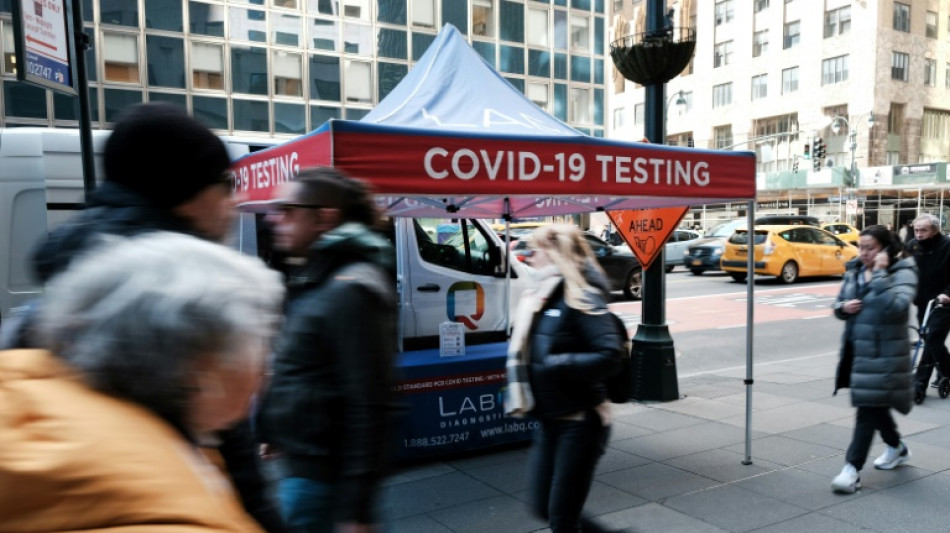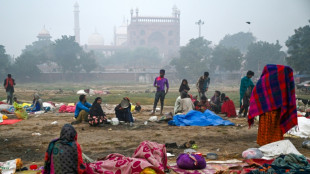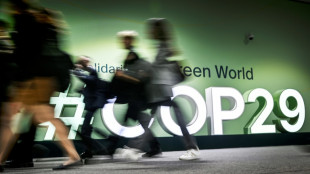
-
 Spate of child poisoning deaths sparks S.Africa xenophobia
Spate of child poisoning deaths sparks S.Africa xenophobia
-
Comedian Conan O'Brien to host Oscars

-
 Rozner overtakes McIlroy and Hatton for Dubai lead
Rozner overtakes McIlroy and Hatton for Dubai lead
-
Mourners bid farewell to medic killed in east Ukraine

-
 Gore says 'absurd' to hold UN climate talks in petrostates
Gore says 'absurd' to hold UN climate talks in petrostates
-
Hamas says 'ready for ceasefire' as Israel presses Gaza campaign

-
 Amorim says Man Utd is 'where I'm supposed to be'
Amorim says Man Utd is 'where I'm supposed to be'
-
Japan hammer Indonesia to edge closer to World Cup spot

-
 Jeff Beck guitar collection to go under the hammer in January
Jeff Beck guitar collection to go under the hammer in January
-
Veteran Ranieri has 'no time for mistakes' on Roma return

-
 Van Nistelrooy says he will 'cherish' Man Utd memories in farewell message
Van Nistelrooy says he will 'cherish' Man Utd memories in farewell message
-
IAEA chief tours sensitive Iran nuclear plants

-
 Pompeii rejects 'mass tourism' with daily visitor limit
Pompeii rejects 'mass tourism' with daily visitor limit
-
Jailed Russian poet could be 'killed' in prison, warns wife

-
 French court orders release of Lebanese militant held since 1984
French court orders release of Lebanese militant held since 1984
-
Global stocks struggle after Fed signals slower rate cuts

-
 UK economy slows, hitting government growth plans
UK economy slows, hitting government growth plans
-
Primary schools empty as smog persists in Indian capital

-
 Palestinians turn to local soda in boycott of Israel-linked goods
Palestinians turn to local soda in boycott of Israel-linked goods
-
Typhoon Man-yi bears down on Philippines still reeling from Usagi

-
 UK growth slows in third quarter, dealing blow to Labour government
UK growth slows in third quarter, dealing blow to Labour government
-
Chris Wood hits quickfire double in NZ World Cup qualifying romp

-
 Markets struggle at end of tough week
Markets struggle at end of tough week
-
China tests building Moon base with lunar soil bricks

-
 Film's 'search for Palestine' takes centre stage at Cairo festival
Film's 'search for Palestine' takes centre stage at Cairo festival
-
Oil execs work COP29 as NGOs slam lobbyist presence

-
 Gore says climate progress 'won't slow much' because of Trump
Gore says climate progress 'won't slow much' because of Trump
-
'Megaquake' warning hits Japan's growth

-
 Stiff business: Berlin startup will freeze your corpse for monthly fee
Stiff business: Berlin startup will freeze your corpse for monthly fee
-
Wars, looming Trump reign set to dominate G20 summit

-
 Xi, Biden attend Asia-Pacific summit, prepare to meet
Xi, Biden attend Asia-Pacific summit, prepare to meet
-
Kyrgios to make competitive return at Brisbane next month after injuries

-
 Dominican Juan Luis Guerra triumphs at 25th annual Latin Grammys
Dominican Juan Luis Guerra triumphs at 25th annual Latin Grammys
-
Landslide win for Sri Lanka president's leftist coalition in snap polls

-
 Australian World Cup penalty hero Vine takes mental health break
Australian World Cup penalty hero Vine takes mental health break
-
As Philippines picks up from Usagi, a fresh storm bears down

-
 Tropical Storm Sara pounds Honduras with heavy rain
Tropical Storm Sara pounds Honduras with heavy rain
-
Pepi gives Pochettino win for USA in Jamaica

-
 'Hell to heaven' as China reignite World Cup hopes with late winner
'Hell to heaven' as China reignite World Cup hopes with late winner
-
Rebel attacks keep Indian-run Kashmir on the boil

-
 New Zealand challenge 'immense but fantastic' for France
New Zealand challenge 'immense but fantastic' for France
-
Under pressure England boss Borthwick in Springboks' spotlight

-
 All Blacks plan to nullify 'freakish' Dupont, says Lienert-Brown
All Blacks plan to nullify 'freakish' Dupont, says Lienert-Brown
-
TikTok makes AI driven ad tool available globally

-
 Japan growth slows as new PM readies stimulus
Japan growth slows as new PM readies stimulus
-
China retail sales pick up speed, beat forecasts in October

-
 Asian markets fluctuate at end of tough week
Asian markets fluctuate at end of tough week
-
Gay, trans people voicing -- and sometimes screaming -- Trump concerns

-
 Argentina fall in Paraguay, Brazil held in Venezuela
Argentina fall in Paraguay, Brazil held in Venezuela
-
N. Korean leader orders 'mass production' of attack drones

| CMSC | 0.04% | 24.56 | $ | |
| RBGPF | 2.67% | 61.84 | $ | |
| SCS | 0.52% | 13.34 | $ | |
| RYCEF | -4.71% | 6.79 | $ | |
| VOD | 1.14% | 8.78 | $ | |
| RIO | 1.11% | 61.11 | $ | |
| BTI | 1.05% | 35.865 | $ | |
| NGG | 0.24% | 62.52 | $ | |
| BCE | -0.71% | 26.65 | $ | |
| GSK | -3.08% | 32.985 | $ | |
| BCC | 1.07% | 141.87 | $ | |
| AZN | -2.39% | 63.52 | $ | |
| RELX | -2.75% | 44.72 | $ | |
| CMSD | 0.17% | 24.4 | $ | |
| JRI | -0.41% | 13.0233 | $ | |
| BP | 0.38% | 29.16 | $ |

Scientists develop mobile printer for mRNA vaccine patches
Scientists said Monday they have developed the first mobile printer that can produce thumbnail-sized patches able to deliver mRNA Covid vaccines, hoping the tabletop device will help immunise people in remote regions.
While many hurdles remain and the 3D printer is likely years away from becoming available, experts hailed the "exciting" finding.
The device prints two-centimetre-wide patches which each contain hundreds of tiny needles that administer a vaccine when pressed against the skin.
These "microneedle patches" offer a range of advantages over traditional jabs in the arm, including that they can be self-administered, are relatively painless, could be more palatable to the vaccine-hesitant and can be stored at room temperature for long periods of time.
The popular mRNA Covid-19 vaccines from Pfizer and Moderna need to be refrigerated, which has caused distribution complications -- particularly in developing countries that have condemned the unequal distribution of doses during the pandemic.
The new printer was tested with the Pfizer and Moderna jabs, according to a study in the journal Nature Biotechnology, but the goal of the international team of researchers behind it is for it to be adapted to whatever vaccines are needed.
Robert Langer, co-founder of Moderna and one of the study's authors, told AFP that he hoped the printer could be used for "the next Covid, or whatever crisis occurs".
Ana Jaklenec, a study author also from the Massachusetts Institute of Technology, said the printer could be sent to areas such as refugee camps or remote villages to "quickly immunise the local population," in the event of a fresh outbreak of a disease like Ebola.
- Vacuum-sealed -
Microneedle patch vaccines are already under development for Covid and a range of other diseases, including polio, measles and rubella.
But the patches have long struggled to take off because producing them is an expensive, laborious process often involving large machines for centrifugation.
To shrink that process down, the researchers used a vacuum chamber to suck the printer "ink" into the bottom of their patch moulds, so it reaches the points of the tiny needles.
The vaccine ink is made up of lipid nanoparticles containing mRNA vaccine molecules, as well as a polymer similar to sugar water.
Once allowed to dry, the patches can be stored at room temperature for at least six months, the study found. The patches even survived a month at a balmy 37 degrees Celsius (99 Fahrenheit).
Mice which were given a vaccine patch produced a similar level of antibody response to others immunised via a traditional injection, the study said.
The printed patches are currently being tested on primates, which if successful would lead to trials on humans.
- 'A real breakthrough'? -
The printer can make 100 patches in 48 hours. But modelling suggested that -- with improvements -- it could potentially print thousands a day, the researchers said.
"And you can have more than one printer," Langer added.
Joseph DeSimone, a chemist at Stanford University not involved in the research, said that "this work is particularly exciting as it realises the ability to produce vaccines on demand".
"With the possibility of scaling up vaccine manufacturing and improved stability at higher temperatures, mobile vaccine printers can facilitate widespread access to RNA vaccines," said DeSimone, who has invented his own microneedle patches.
Antoine Flahault, director of the Institute of Global Health at the University of Geneva, said that production and access to vaccines could be "transformed through such a printer".
"It might become a real breakthrough," he told AFP, while warning that this depended on approval and mass production, which could take years.
Darrick Carter, a biochemist and CEO of US biotech firm PAI Life Sciences, was less optimistic.
He said that the field of microneedle patches had "suffered for 30 years" because no one had yet been able to scale up manufacturing in a cost-effective way.
"Until someone figures out the manufacturing scale-up issues for microneedle patches they will remain niche products," he told AFP.
O.Johnson--AMWN


